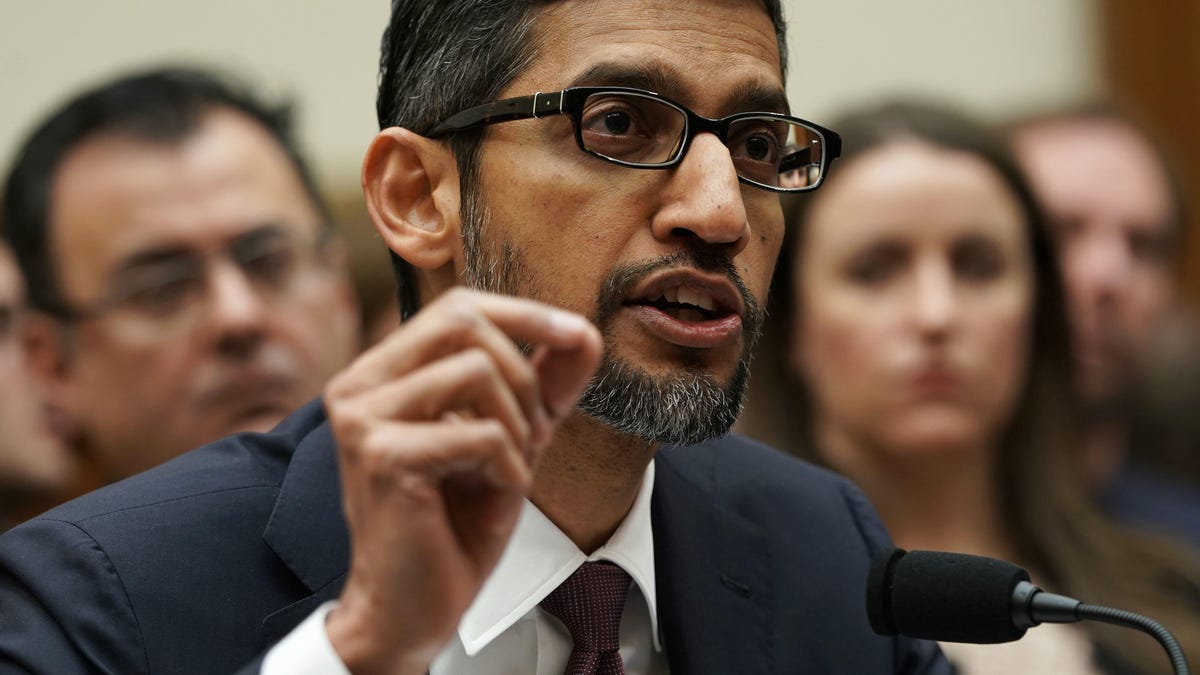Google CEO: 'We can do better' on explaining privacy controls to users
Privacy came up a lot during Sundar Pichai's testimony to Congress.

Google CEO Sundar Pichai testifies before Congress on Tuesday.
Google CEO Sundar Pichai faced a lot of questions about user privacy as he testified to the House Judiciary Committee on Tuesday. Among them was a straightforward request: Can you make your products easier for users to understand?
The question came from Rep. Darrell Issa, a Republican from California, who said that even though Google offers a privacy dashboard where users can tailor their settings, it's not always obvious how to use it.
Issa asked Pichai if he could commit "to improve the dashboard, the transparency and the tools available to teach people how to protect their privacy, how to offload data, how to in fact turn off things they might not want to have."
Pichai said yes. "I do think we can do better," he said. "We want to simplify it."
The back-and-forth came after members of Congress had pressed Pichai on a number of privacy concerns. Among them were Google's collection of user location data, the software flaws that exposed information from millions of accounts of Google+ users and the question of privacy regulations. The questioning showed that lawmakers are mulling privacy concerns about Google and other tech companies at a time when the public is increasingly aware of privacy issues and legislators are considering regulations.
Pichai said Google supports federal regulations on privacy, doubling down on his company's previous calls for a national framework instead of a state-by-state approach. In September, Google released its proposal for federal privacy regulations. The proposal came after California implemented a privacy law in June that's the toughest in the country.
Rep. Zoe Lofgren, a Democrat from California, in a district that includes Google's future headquarters in San Jose, asked Pichai about location data. She wanted to know how much data on a user's location an Android phone would collect if location services are turned off.
None, Pichai answered, but then he added, "Your IP address may provide some location information." Reports this year have shown that Google obtains user location data, even when location services are turned off, through its collection of information about Wi-Fi connection points.
In response to further questions about that location data collection, from Rep. Steve Cohen, a Democrat from Tennessee, Pichai clarified that other companies also gather location data from users' IP addresses, and that Google largely does it for security purposes.
"Location turns out to be in the fabric of how people use the internet," Pichai said. "It is a complex area, we realize we need to do better, and we are working on it."
Rep. Doug Collins, a Republican from Georgia, pressed Pichai on how Google treats several different kinds of data, including things like names, ages, location, and conversations.
Pichai stressed that users can tailor those settings, adding that 20 million users make changes to their account settings every day. With regard to recorded conversations for example, Pichai said, "We won't collect conversations unless you specifically ask us to."
Collins noted that Google uses data from its users to tailor ads, and asked Pichai what the company does to limit the amount of data it keeps on its users.
"We need minimal data to do advertising," Pichai said. The data that Google does store is kept, he said, "to help give users the experience they want."
CNET's Holiday Gift Guide: The place to find the best tech gifts for 2018.
The Honeymoon Is Over: Everything you need to know about why tech is under Washington's microscope.

